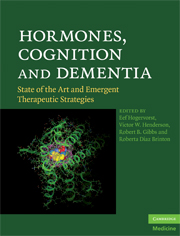Book contents
- Hormones, Cognition and Dementia
- Hormones, Cognition and Dementia
- Copyright page
- Contents
- Contributors
- Preface
- Section 1 Estrogens and cognition: perspectives and opportunities in the wake of the Women's Health Initiative Memory Study
- Section 2 Varieties of estrogenic therapy
- Section 3 Potential modulators and modifiers of estrogenic effects
- Section 4 Possible genetic factors related to hormone treatment effects
- Section 5 Testosterone, estradiol and men, and sex hormone binding globulin
- Section 6 Gonadotropin effects
- Chapter 26 Involvement of gonadotropins in cognitive function: implications for Alzheimer's disease
- Chapter 27 The role of gonadotropins and testosterone in the regulation of beta-amyloid metabolism
- Chapter 28 Epilogue
- Chapter 29 Concluding remarks
- Index
- Plate Section
Chapter 28 - Epilogue
from Section 6 - Gonadotropin effects
Published online by Cambridge University Press: 06 July 2010
- Hormones, Cognition and Dementia
- Hormones, Cognition and Dementia
- Copyright page
- Contents
- Contributors
- Preface
- Section 1 Estrogens and cognition: perspectives and opportunities in the wake of the Women's Health Initiative Memory Study
- Section 2 Varieties of estrogenic therapy
- Section 3 Potential modulators and modifiers of estrogenic effects
- Section 4 Possible genetic factors related to hormone treatment effects
- Section 5 Testosterone, estradiol and men, and sex hormone binding globulin
- Section 6 Gonadotropin effects
- Chapter 26 Involvement of gonadotropins in cognitive function: implications for Alzheimer's disease
- Chapter 27 The role of gonadotropins and testosterone in the regulation of beta-amyloid metabolism
- Chapter 28 Epilogue
- Chapter 29 Concluding remarks
- Index
- Plate Section
Summary
- Type
- Chapter
- Information
- Hormones, Cognition and DementiaState of the Art and Emergent Therapeutic Strategies, pp. 269 - 270Publisher: Cambridge University PressPrint publication year: 2009



